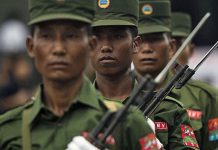By Stefan J. Bos, Chief International Correspondent BosNewsLife

OSH/BUDAPEST (BosNewsLife)– Kyrgyz Christians were risking their lives Thursday, June 17, to help and shelter Uzbek believers in southern Kyrgystan, where ethnic clashes killed at least 190 people, injured 1,800 others and uprooted some 400,000 residents, Christian aid workers said.
“Amid the carnage, Kyrgyz Christians are trying to help their Uzbek brothers and sisters escape the violence – despite the prospect of severe retribution from fellow Kyrgyz if they are caught,” explained Barnabas Fund, a group supporting minority Christians in predominantly Islamic nations.
A Kyrgyz pastor, identified only as Pastor K. for security reasons, his wife and church members are among Kyrgyz Christians receiving death threats for supporting Uzbek Christians, added the group.
“On Tuesday, June 15, Pastor K. and some members of his church were helping an Uzbek Christian woman to find a safe place when they were stopped by an angry mob, armed with knives and axes. The group demanded to know who Pastor K. was trying to help a and threatened to set fire to his car and kill them,” Barnabas Fund said.
“A man wielding an axe came close to cutting off the pastor’s arm. When Pastor K. told the mob that he was distributing aid, they kept three Christian women, including his wife, hostage and went with him to see where the aid was being distributed, to check the truth of his story,” Barnabas Fund told BosNewsLife.
PREACHING CHRIST
“When they returned to the group, Pastor K. and the Christian women took the opportunity to witness to them [about their faith in the] Lord Jesus Christ. The mob calmed down and set the pastor and the women free.”
Others were not so lucky. Witnesses said Kyrgyz gangs have burned homes and slaughtered minority Uzbeks since violence broke out last Thursday, June 10, in Osh, Kyrgyzstan’s second largest city. “There have been reports of rapes and there are now virtually no Uzbek women left in Osh, most having fled to the border with Uzbekistan,” added Barnabas Fund in a statement.

The U.N. humanitarian office said Thursday, June 18, that the number of people uprooted by unrest in Kyrgyzstan has reached 400,000. Spokeswoman Elisabeth Byrs added that the estimated number of people driven from their homes but still inside Kyrgyzstan is 300,000. She said there are now also about 100,000 refugees in neighboring Uzbekistan, with many still trying to get into the country, which closed its borders earlier this week.
Barnabas Fund cited pastors however as saying that some Uzbek Christian women are still left behind, hiding in the basement of a house in Osh, “unable to leave because of roadblocks and a curfew between 6pm and 6am” local time.
“Predominantly converts from Islam, Kyrgyz and Uzbek Christians are always vulnerable to persecution from the Muslim majority community or the authorities. They are now being threatened by the mob simply for being Christians,” Barnabas Fund said.
CLASHES SPREAD
Clashes have spread to the nearby city of Jalalabad and surrounding areas, prompting the interim government to appeal for international peacekeepers.
So far Russia, the United States and other nations have declined sending troops to the troubled region, but they are offering humanitarian aid, using a tense calm to fly in goods to the conflict area, officials said.
Kyrgyz and Uzbek Christians live in many of the towns and villages around Osh and Jalalabad, “but they are united despite the conflict,” Barnabas Fund noted. The well-informed group also reported what local Christians would consider “miraculous” escapes. “A church building in Jalalabad was about to be attacked when quarrels broke out amongst the mob and they moved away.”
The interim government of Kyrgyzstan, a mainly Islamic nation, has accused exiled President Kurmanbek Bakiyev of fueling ethnic

tensions ahead of an upcoming referendum on reducing presidential powers and elections later this year.
Osh and Jalalabad are considered political strongholds of Bakiyev, who was forced to flee to Belarus following an April uprising that killed at least 85 people. Bakiyev has strongly denied involvement in the latest riots. At a recent news conference he urged “the brethren in Kyrgyzstan and [neighboring] Uzbekistan to end the bloodshed” because in his words “the interim government is unable to act.”
U.N. DOUBTS
However the spokesman for the United Nations High Commissioner for Human Rights Rupert Colville suggested that the initial violence was orchestrated by forces wanting to destabilize the country. “We have strong indications that this event was not a spontaneous inter-ethnic clash – that it was to some degree orchestrated, targeted and well-planned,” he told reporters this week.
On Wednesday, June 16, the interim government declared three days of mourning and television footage showed Uzbeks crying for their dead, with bodies laying on the streets.
Even if the bloodshed ends, tensions are expected to remain between Kyrgyz and minority Uzbeks, although both communities are mainly Muslims and speak almost the same language.
Observers say Kyrgyz people, who are mainly nomads and impoverished, have expressed jealousy towards the generally more rich Uzbeks as they are in many cases successful farmers or entrepreneurs.
Additionally, there are tensions between Kyrgyzstan and Uzbekistan over natural resources in the volatile region, which was divided by Soviet leader Joseph Stalin. There is international concern that the ethnic conflict will lead to an armed confrontation between the two neighboring nations.
MORE DIFFICULTIES
Barnabas Fund warned that the latest violence adds to difficulties “of small Christian minorities within the Kyrgyz and Uzbek peoples [who] are almost all converts from Islam, and as such are vulnerable to persecution.”
Kyrgyzstan had “reasonable religious liberty” until a new religion law was introduced in 2009, “which has brought increasing difficulties for Christians,” the group said. “Neighboring Uzbekistan, where the refugees are trying to flee, is the worst of the Central Asian republics for religious freedom and Christians experience regular harassment and punishment.”
Barnabas Fund’s International Director Patrick Sookhdeo told BosNewsLife that it is “it is heartening to know that Christians are setting an example of love across ethnic groups” amid a bitter conflict. He said his group had urged its supporters to “re-double” prayers “in the light of today’s news that all Christians are now becoming a target, simply because of their faith in the Lord Jesus.”
Ethnic Kyrgyz comprise nearly 70 percent of the predominantly Muslim population of Kyrgyzstan with Uzbeks accounting for around 15 percent, according to official figures. Christians make up roughly 10 percent of the impoverished Central Asian nation’s over five million people.









I do not accept as true with this particular blog post. Nonetheless, I did searched with Google and I have found out that you’re right and I was thinking in the improper way. Keep on producing good quality material such as this.
I did not agree with this particular article. Nonetheless, I had researched with Bing and I have found out that you are correct and I had been thinking in the incorrect way. Keep on producing top quality articles such as this.